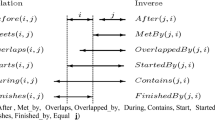Abstract
Timetables have been an important part of any organization. They are related to resource allocation and time scheduling problems. To date, many universities make timetables manually, which are inefficient and consume a lot of time. Also, a large number of backtracks are required if some inconsistency is encountered. To generate a university timetable automatically, we present an ontology-driven approach that is much more efficient than the existing approaches. This model represents various concepts of the academic domain into classes and relationships and satisfies four types of constraints—hard, soft, temporal and priority. The model is transformed into an application built using the Apache Jena library. This application automatically generates the timetable when resource instances like faculty, venue and timeslot are populated to it. The inconsistencies are removed using ontology reasoners. The main objective of this work is to find a reusable solution or template that provides generality of the domain. Due to the inherent features of ontology, the model also provides interoperability among different departments of the university as well as different vendor-specific applications.
Access this chapter
Tax calculation will be finalised at checkout
Purchases are for personal use only
Similar content being viewed by others
References
Burke, E.K., Petrovic, S.: Recent research directions in automated timetabling. Eur. J. Oper. Res., pp. 266–280 (2002)
Modupe, A.O., Olusayo, O.E., Olatunde, O.S.: Development of a university lecture timetable using modified genetic algorithms approach. Int. J. Adv. Res. Comput. Sci. Softw. Eng. 4, 163–168 (2016)
Burke, E.K., Petrovic, S., Qu, R.: Case-based heuristic selection for timetabling problems. J. Sched. 9, 115–132 (2006)
Sarin, S.C., Wang, Y., Varadarajan, A.: A university-timetabling problem and its solution using Benders’ partitioning-a case study. J. Sched. 13, 131–141 (2010)
Protégé documentation, https://protegewiki.stanford.edu/wiki/. Last Accessed 2019/04/08
Hemlatha, M., Uma, V., Aghila, G.: Time ontology with reference event based temporal relations (RETR). Int. J. Web Semant. Technol. 3, 23–31 (2012)
Zhang, Y., Hu, Q., Meng, Z., Ralescu, A.: Fuzzy dynamic timetable scheduling for public transit. Fuzzy Sets Syst. (2019)
Abayomi-Alli, O., Abayomi-Alli, A., Misra, S., Damasevicius, R., Maskeliunas, R.: Automatic Examination Timetable Scheduling Using Particle Swarm Optimization and Local Search Algorithm. Data Engineering and Applications. Springer, Singapore (2019)
Liu, T., Ceder, A.: Integrated public transport timetable synchronization and vehicle scheduling with demand assignment: a bi-objective bi-level model using deficit function approach. Transp. Res. Procedia 23, 341–361 (2017)
Staab, S., Studer, R.: Handbook on Ontologies, 2nd edn. Springer, Heidelberg (2009)
Allen, J.F.: Maintaining knowledge about temporal intervals. Commun. ACM 26, 832–843 (1983)
Apache Jena documentation, http://jena.apache.org/documentation/. Last Accessed 2019/04/10
Bob, D.: Learning SPARQL, 1st edn. O’Reilly Media, 1005 Gravenstein Highway North, CA 95472, USA (2011)
Author information
Authors and Affiliations
Corresponding author
Editor information
Editors and Affiliations
Rights and permissions
Copyright information
© 2020 Springer Nature Singapore Pte Ltd.
About this paper
Cite this paper
Bajpai, S., Chaturvedi, A. (2020). Ontology-Driven Framework to Automatically Generate University Timetable. In: Bansal, J., Gupta, M., Sharma, H., Agarwal, B. (eds) Communication and Intelligent Systems. ICCIS 2019. Lecture Notes in Networks and Systems, vol 120. Springer, Singapore. https://doi.org/10.1007/978-981-15-3325-9_6
Download citation
DOI: https://doi.org/10.1007/978-981-15-3325-9_6
Published:
Publisher Name: Springer, Singapore
Print ISBN: 978-981-15-3324-2
Online ISBN: 978-981-15-3325-9
eBook Packages: Intelligent Technologies and RoboticsIntelligent Technologies and Robotics (R0)




